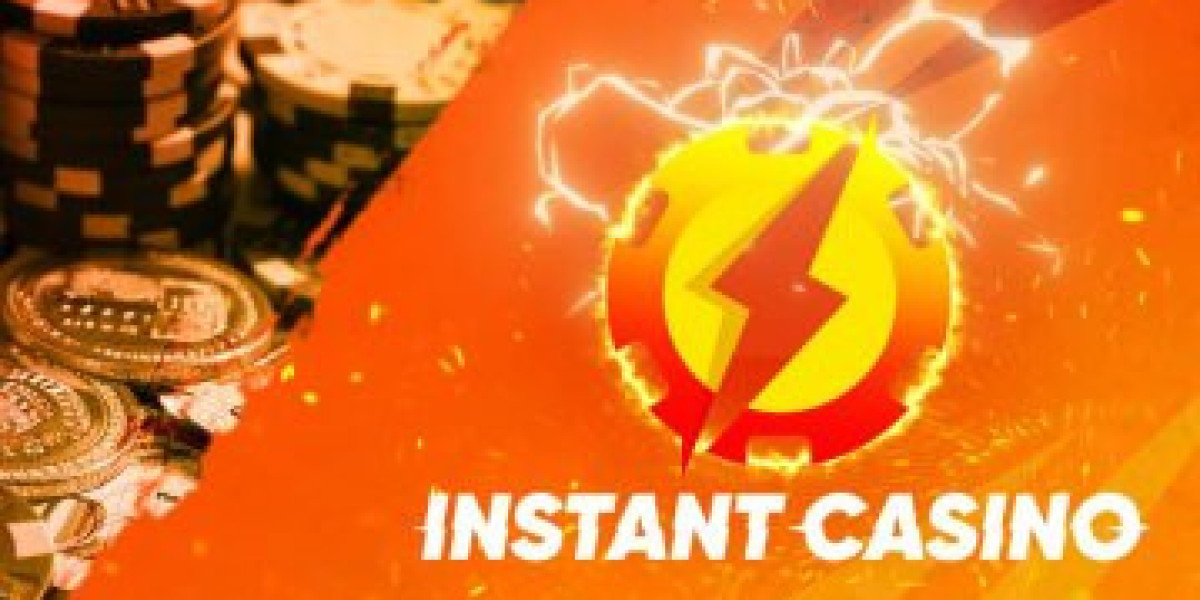The online gambling industry has undergone a dramatic transformation since its inception in the mid-1990s. From clunky dial-up connections and limited game selections to today's sophisticated platforms offering seamless gameplay on any device, the evolution has been nothing short of revolutionary. One of the most significant developments in recent years has been the emergence of "instant casinos," also known as no-account casinos or Pay N Play casinos. These platforms offer a dramatically simplified and faster gambling experience, eliminating the traditional registration process and allowing players to deposit and play instantly. This article delves into the rise of instant casinos, exploring their mechanics, advantages, disadvantages, regulatory landscape, and future prospects.
The Genesis of Instant Casinos: A Response to Player Frustration
Traditional online casinos, while offering convenience compared to brick-and-mortar establishments, often suffer from a cumbersome registration process. Players are typically required to fill out lengthy forms, providing personal details such as name, address, date of birth, and email address. This process can be time-consuming and deter potential players, especially those hesitant to share their information online. Furthermore, the subsequent verification process, requiring the submission of identification documents like passports or driver's licenses, can add further delays and frustration.
This friction point in the traditional online casino experience created a demand for a simpler, faster alternative. Instant casinos emerged as a direct response to this demand, offering a streamlined experience that eliminates the need for registration and verification. The core principle behind instant casinos is the leveraging of online banking systems for both identity verification and payment processing.
How Instant Casinos Work: The Magic of Trustly and Beyond
The functionality of instant casinos hinges on secure and reliable payment solutions, primarily those that facilitate direct bank transfers. While various payment providers have entered the space, Trustly pioneered the technology and remains a dominant player. The process typically works as follows:
- Selection of a Casino: The player chooses an instant casino that supports their bank and preferred payment method.
- Deposit: Instead of creating an account, the player clicks the "Deposit" button and selects their bank from a list of supported institutions.
- Bank Login: The player is redirected to their online banking portal, where they securely log in using their existing bank credentials.
- Payment Authorization: The player selects the account from which they wish to deposit funds and authorizes the transaction.
- Automated Account Creation (Behind the Scenes): While the player perceives an instant deposit, the casino leverages the bank's data to automatically create a player account in the background. The bank provides the casino with essential information for KYC (Know Your Customer) compliance, such as the player's name, address, and date of birth.
- Instant Play: The funds are instantly credited to the player's newly created account, and they can immediately begin playing their favorite casino games.
- Withdrawal: When the player wants to withdraw their winnings, they simply select the withdrawal option, and the funds are transferred back to their bank account through the same secure channel.
Advantages of Instant Casinos: Speed, Security, and Simplicity
Instant casinos offer a compelling array of advantages that have contributed to their growing popularity:
Speed and Convenience: The most obvious advantage is the speed and convenience of the instant casino experience. Players can deposit and start playing within minutes, without the hassle of registration forms or verification delays.
Enhanced Security: By utilizing bank-level security protocols, instant casinos offer a high level of security for transactions and personal data. The player's bank acts as a trusted intermediary, ensuring that their financial information is protected.
No Account Required: The elimination of the account creation process reduces the risk of data breaches and identity theft. Players do not need to store usernames and passwords, further minimizing their vulnerability.
Faster Withdrawals: Withdrawals are typically processed much faster at instant casinos than at traditional online casinos. Since the player's identity has already been verified through their bank, there are no additional verification steps required before processing the withdrawal.
Transparency and Trust: The direct connection with the player's bank enhances transparency and builds trust. Players can track their transactions directly through their bank statements, providing them with greater control over their funds.
Simplified KYC and AML Compliance: While KYC is still essential, the process is significantly streamlined. The casino relies on the bank's verification data, reducing the need for manual verification and simplifying compliance with anti-money laundering (AML) regulations.
Disadvantages of Instant Casinos: Limitations and Considerations
Despite their numerous advantages, instant casinos also have some limitations:
Limited Availability: Instant casinos are not available in all countries. The technology relies on the availability of secure and reliable online banking systems, which are not ubiquitous across the globe.
Bank Dependency: Players are limited to using banks that are supported by the casino's payment provider. This can be a constraint for players who prefer to use alternative payment methods or whose bank is not supported.
Fewer Bonuses and Promotions: Some instant casinos may offer fewer bonuses and promotions than traditional online casinos. This is because the streamlined experience often comes at the cost of reduced marketing budgets.
Potential for Higher Transaction Fees: Depending on the payment provider and the player's bank, there may be transaction fees associated with deposits and withdrawals.
Limited Account Customization: The lack of a traditional account means that players have limited options for customizing their gaming experience. For example, they may not be able to set deposit limits or track their playing history as easily.
Not Suitable for All Players: Players who prefer to use alternative payment methods like e-wallets or cryptocurrencies may find instant casinos less appealing. Similarly, players who enjoy the social aspects of traditional online casinos, such as participating in tournaments or interacting with other players, may find the experience at instant casinos less engaging.
Regulatory Landscape: Navigating the Complexities
The regulatory landscape for instant casinos is still evolving. As these platforms gain popularity, regulators are grappling with how to best oversee them and ensure compliance with existing gambling laws. Some key considerations include:
Licensing Requirements: Instant casinos are typically required to obtain a gambling license from a reputable jurisdiction. The licensing process ensures that the casino meets certain standards of fairness, security, and responsible gambling.
KYC and AML Compliance: While instant casinos leverage bank data for KYC purposes, they are still responsible for complying with AML regulations. This includes monitoring transactions for suspicious activity and reporting any potential money laundering.
Data Protection: Instant casinos must comply with data protection laws, such as GDPR, to ensure that players' personal information is handled securely and responsibly.
Responsible Gambling: Instant casinos must implement responsible gambling measures, such as offering self-exclusion options and providing resources for players who may be struggling with problem gambling.
Payment Provider Regulations: The payment providers that facilitate transactions for instant casinos are also subject to regulatory oversight. They must comply with financial regulations and ensure the security of transactions.
The specific regulatory requirements for instant casinos vary depending on the jurisdiction. Some jurisdictions have specific regulations in place for these platforms, while others apply existing gambling laws to them. As the industry continues to evolve, it is likely that the regulatory landscape will become more defined and consistent.
The Future of Instant Casinos: Trends and Predictions
The future of instant casinos appears bright, with several trends and developments shaping their trajectory:
Increased Adoption: As more players discover the speed, convenience, and security of instant casinos, adoption is expected to continue to grow.
Expansion to New Markets: As online banking systems become more prevalent around the world, instant casinos will likely expand into new markets.
Technological Advancements: Technological advancements, such as blockchain technology and biometric authentication, could further enhance the security and efficiency of instant casinos.
Integration with Other Payment Methods: While instant casinos currently rely primarily on bank transfers, they may integrate with other payment methods in the future to offer players more flexibility.
Enhanced User Experience: Instant casinos are constantly evolving to provide players with a more engaging and immersive gaming experience. This includes improvements to the user interface, game selection, and mobile compatibility.
Stricter Regulatory Oversight: As the industry matures, regulatory oversight is expected to become stricter and more consistent. This will help to ensure that instant casinos operate responsibly and protect players.
Focus on Responsible Gambling: Instant casinos are increasingly focused on promoting responsible gambling. This includes implementing measures to prevent problem gambling and providing resources for players who may be struggling.
Personalization and AI: Leveraging AI to personalize the gaming experience for each player, offering tailored game recommendations and responsible gambling alerts based on individual playing patterns.
Metaverse Integration: Exploring opportunities to integrate instant casino (instant-casino-online-nl.com) functionalities within metaverse environments, creating immersive and interactive gambling experiences.
In conclusion, instant casinos represent a significant innovation in the online gambling industry. By eliminating the traditional registration process and offering a streamlined experience, they have revolutionized the way players access and enjoy casino games. While challenges remain, the advantages of speed, security, and convenience make instant casinos a compelling option for many players. As technology continues to evolve and regulations become more defined, instant casinos are poised to play an increasingly prominent role in the future of online gambling. The industry's focus will likely shift towards enhanced player protection, improved user experiences, and the integration of emerging technologies to solidify its position as a leading force in the online entertainment landscape.







